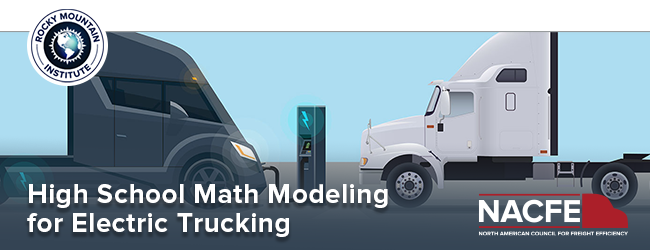WINNERS ANNOUNCED FOR MATHWORKS MATH MODELING ELECTRIC TRUCK CHALLENGE

The Society for Industrial and Applied Mathematics (SIAM) just announced the winners of this year’s MathWorks Math Modeling Challenge (M3) which focused on electric trucks
| Because of COVID-19, we have become more aware of the supply chain and the important role trucks play in our daily lives. However, even before the crisis began, the topic of trucking’s transition to electrification was beginning to percolate. Electric trucks were front and center at this year’s MathWorks Math Modeling (M3) Challenge, a prestigious competition that demonstrates the importance of math in everyday life. A program of Society for Industrial and Applied Mathematics (SIAM), M3 Challenge is designed to motivate students to study and pursue careers in applied math, computational science, and technical computing. [See videos from each winning team here.] Now in its 15th year, the 2020 M3 Challenge saw students from 760 teams spend 14 consecutive hours between February 28 and March 2 using mathematical modeling tools to solve a real-world challenge that the North American Council for Freight Efficiency (NACFE) helped develop. Students were tasked with creating a model to predict the percentage of semitrucks that will be electric in the next few years and decades. They were also asked to determine the number and locations of charging stations along major US trucking routes that will be needed for an all-electric trucking industry. And, finally, they were asked to prioritize which routes should be targeted first for development of electric charging infrastructure. |
| “Trucking has evolved to be a much cleaner industry, but we face challenges that will require bright minds and innovative solutions. That is why I am excited about the 3,500 high school students that recently took part in the MathWorks Math Modeling Challenge.” — Mike Roeth, Executive Director, NACFE. |
| “Trucking has evolved to be a much cleaner industry,” said Mike Roeth, Executive Director of NACFE, “but we face challenges that will require bright minds and innovative solutions. That is why I am excited about the 3,500 high school students that recently took part in the MathWorks Math Modeling Challenge.” Ned Harvey, Managing Director of Rocky Mountain Institute’s Industry Programs, which as part of its work focuses on trucking, said, “If there’s one thing that we’ve learned from the COVID crisis is that there is tremendous power in the combination of the necessity for innovation and entrepreneurial spirit. The pandemic exposed the vulnerability of our global supply chains, and it’s tremendously exciting to see all of these young students ‘hack’ the problem. Our deepest gratitude goes out to all the teams and judges and congratulations to the six finalists. However, the real winner will be the future of trucking.” After a rigorous, six-week-long judging process by a panel of 149 experts, six teams were named finalists. From those finalists, a winner was chosen. |
| “It’s tremendously exciting to see all of these young students ‘hack’ the problem. Congratulations to the six finalists. However, the real winner will be the future of trucking.” — Ned Harvey, Managing Director, Rocky Mountain Institute |
| The winning teams in this year’s challenge are: M3 Challenge Champion, $20,000 Team Prize Pine View School (Team #13343), Osprey, Florida Coach: Mark Mattia / Students: Nicholas Butakow, Pragnya Govindu, Christiana Guan, Michael Gutierrez, Kristoffer Selberg M3 Challenge Runner Up, $15,000 Team Prize White Station High School (Team #13249), Memphis, Tennessee Coach: Yanli Cui / Students: Kevin Cao, Andrew Chen, Krishna Dasari, Kevin Luo, Jonathan Zhang M3 Challenge Third Place, $10,000 Team Prize Adlai E. Stevenson High School (Team #13202), Lincolnshire, Illinois Coach: Paul Kim / Students: Philena Liu, Brandon Lu, Sai Merneedi, Praneet Rathi, Joshua Tsai In keeping with NACFE’s position that there is no one-size-fits-all solution for electrification, the final teams found that there will need to be different solutions to meet the needs of all industry sectors. The teams were also able to grasp the concept of market penetration S-curves and used them to model adoption rates and innovation. This is also a common theme in NACFE’s Annual Fleet Fuel Study reflecting real-world decision-making on technology adoption. |
Category: Electric Vehicles, Featured, Fuel & Oil, General Update, Green, News










